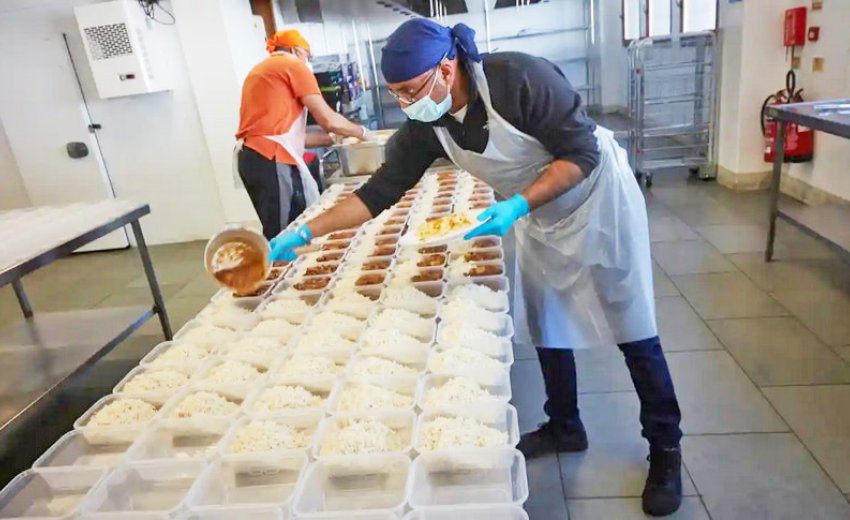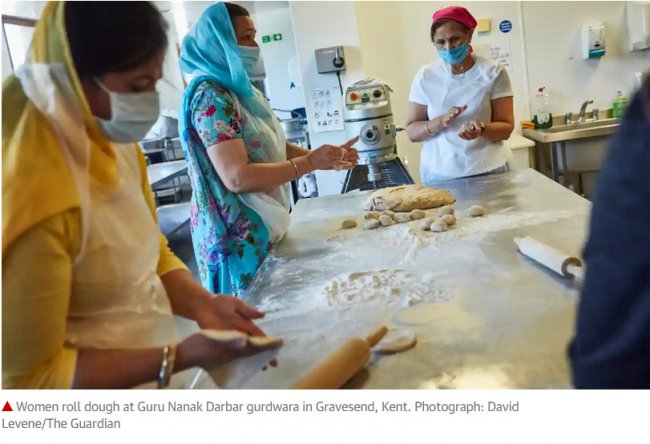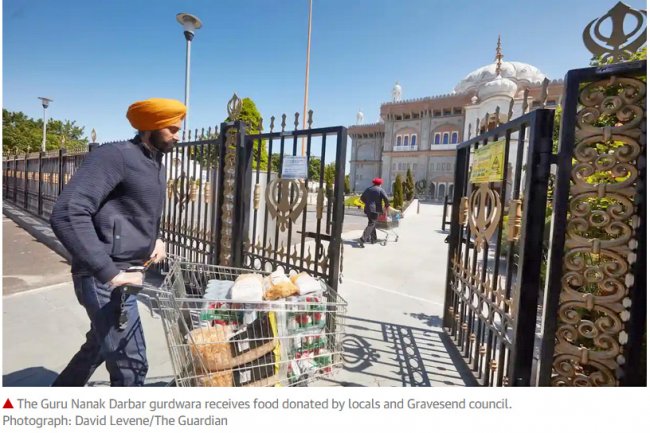They start at 4am, chopping vegetables, mixing spices, soaking legumes, kneading chapati dough. Scores of volunteers are split into five teams working in shifts: cooking, packing, delivering, cleaning and answering the phones.
By the end of the day, at least 850 meals have been delivered to staff at five nearby hospitals, care homes and vulnerable individuals. Some days, the number hits 1,000.
For the Sikh community that – in normal times – worships at the Guru Nanak Darbar gurdwara in Gravesend, Kent, this is simply an adaptation of langar, the communal kitchen that provides free food to the needy day in and day out.
The coronavirus crisis has extended the definition of those in need beyond the poor, homeless and lonely to frontline workers fighting the disease in long, exhausting shifts in hospitals and care homes. The gurdwara’s deliveries remove the need to bring food from home or grab a snack from a vending machine.
The work of the Gravesend gurdwara is just one example of a marathon, nationwide effort to feed the NHS over recent weeks. Restaurants and cafes forced to close to the public by the lockdown have created and delivered meals. Fast food chains have joined the effort, bakers have contributed sweet treats, and Deliveroo has pledged to make half a million meals available free to NHS workers in hospitals.
Churches, mosques, synagogues and other faith organisations are stepping up to support the NHS and other frontline workers. A church in Bath, St Michael’s Without, has turned over its space for a PPE production line. Exeter Cathedral’s Company of Tapisers has set aside their delicate stitching of vestments and kneelers to run up hospital scrubs. Christ Church in Anfield has teamed up with Liverpool football club to offer free meals to vulnerable and elderly people.
Mosques all over the country are taking Ramadan iftar meals to Muslims on the frontline and to people isolated at home. The United Synagogue is delivering “Shabbat in a box” to Jews in isolation or in need.
The Guru Nanak Darbar gurdwara started its NHS meal delivery service on 23 March , the daythe lockdown was announced. Then, eight meals were prepared and distributed. Now, demand is so great that the community has been forced to direct some requests to other gurdwaras.
All through the day, volunteers deliver donations of ingredients from local companies, supermarkets and individuals to the padlocked gates of the imposing temple, built on an 3 hectare (8 acre) site that includes sports grounds and a day care centre for the elderly. The gurdwara’s walls and interior are decorated with marble inlaid with precious stones from Rajasthan, mosaics, and intricately carved wood from Punjab.
Its three huge halls for worship and weddings are currently empty, but the kitchens house efficient production lines for preparing and packaging food. In one kitchen, eight women rolled balls of chapati dough into more than 400 discs before flipping them on a hot stove and rubbing them with butter. Others stirred vats of soya curry to hasten the cooling process and chopped peppers for the next day’s dish.
In a second kitchen, volunteers portioned rice and kala chana into recyclable plastic containers, and rolled chapatis in tin foil. All the food is refrigerated before delivery.
According to Manpreet Singh Dhaliwal, 30, who was elected as the gurdwara’s president in January, the past few weeks have manifested a generational shift. “Normally it is the older generation who volunteer [for langar], while their children and grandchildren are at work. Now the older ones are stuck at home, and the younger ones have the time to help.”
It is very painful for older members of the community not to be able to visit the gurdwara to pray or to help with outreach work, he added. Sikhs are taught from an early age the importance of service to the community.
Seven miles away, at Darent Valley hospital, Leslieann Osborn, who is normally the director of strategy and planning, now focused on operational matters, was ready for the late morning delivery of food from the gurdwara.
“We’ve been absolutely blown away by the generosity of the community and the temple,” she said. “Every single day they’ve brought lunch and dinner for staff. At the peak of this crisis, staff in critical care and respiratory wards simply didn’t have time to get food. This has kept them nourished.”
The hospital had passed a peak in Covid-19 admissions, she said. “The intensive care unit is back to normal full capacity. At the peak, it tripled. After two months of working at very high adrenaline levels, we need to reflect and learn the lessons that will prepare us for a second peak.”
During the darkest days, the frontline workers had been sustained emotionally by “the love of the community” and physically by the food it had brought to the hospital doors. “And it’s delicious. I could live off these lunches forever.”


